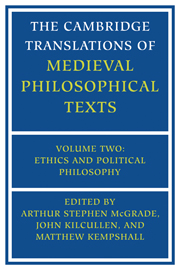Book contents
- Frontmatter
- Contents
- Preface
- General Introduction
- 1 ALBERT THE GREAT: Questions on Book X of the Ethics
- 2 BONAVENTURE: Conscience and Synderesis
- 3 GILES OF ROME: On the Rule of Princes (selections)
- 4 PETER OF AUVERGNE: Commentary and Questions on Book III of Aristotle's Politics (selections)
- 5 HENRY OF GHENT: Is It Rational for Someone without Hope of a Future Life to Choose to Die for the Commonwealth?
- 6 GODFREY OF FONTAINES: Does a Human Being Following the Dictates of Natural Reason Have to Judge that He Ought to Love God More than Himself?
- 7 JAMES OF VITERBO: Does a Human Being Have a Greater Natural Love for God than for Himself, or Vice Versa?
- 8 GODFREY OF FONTAINES: Reply to James of Viterbo on Love of God and Self
- 9 HENRY OF GHENT: Is a Subject Bound to Obey a Statute When It Is Not Evident that It Promotes the Common Utility?
- 10 GODFREY OF FONTAINES: Are Subjects Bound to Pay a Tax When the Need for It Is Not Evident?
- 11 JAMES OF VITERBO: Is It Better to Be Ruled by the Best Man than by the Best Laws?
- 12 JOHN OF NAPLES: Should a Christian King Use Unbelievers to Defend His Kingdom?
- 13 WILLIAM OF OCKHAM: Using and Enjoying
- 14 AUGUSTINE OF ANCONA: Summa on Ecclesiastical Power (selections)
- 15 WILLIAM OF OCKHAM: Is an Errant Individual Bound to Recant at the Rebuke of a Superior?
- 16 JEAN BURIDAN: Questions on Book X of the Ethics
- 17 JOHN WYCLIF: On Civil Lordship (selections)
- Index
6 - GODFREY OF FONTAINES: Does a Human Being Following the Dictates of Natural Reason Have to Judge that He Ought to Love God More than Himself?
Published online by Cambridge University Press: 05 June 2012
- Frontmatter
- Contents
- Preface
- General Introduction
- 1 ALBERT THE GREAT: Questions on Book X of the Ethics
- 2 BONAVENTURE: Conscience and Synderesis
- 3 GILES OF ROME: On the Rule of Princes (selections)
- 4 PETER OF AUVERGNE: Commentary and Questions on Book III of Aristotle's Politics (selections)
- 5 HENRY OF GHENT: Is It Rational for Someone without Hope of a Future Life to Choose to Die for the Commonwealth?
- 6 GODFREY OF FONTAINES: Does a Human Being Following the Dictates of Natural Reason Have to Judge that He Ought to Love God More than Himself?
- 7 JAMES OF VITERBO: Does a Human Being Have a Greater Natural Love for God than for Himself, or Vice Versa?
- 8 GODFREY OF FONTAINES: Reply to James of Viterbo on Love of God and Self
- 9 HENRY OF GHENT: Is a Subject Bound to Obey a Statute When It Is Not Evident that It Promotes the Common Utility?
- 10 GODFREY OF FONTAINES: Are Subjects Bound to Pay a Tax When the Need for It Is Not Evident?
- 11 JAMES OF VITERBO: Is It Better to Be Ruled by the Best Man than by the Best Laws?
- 12 JOHN OF NAPLES: Should a Christian King Use Unbelievers to Defend His Kingdom?
- 13 WILLIAM OF OCKHAM: Using and Enjoying
- 14 AUGUSTINE OF ANCONA: Summa on Ecclesiastical Power (selections)
- 15 WILLIAM OF OCKHAM: Is an Errant Individual Bound to Recant at the Rebuke of a Superior?
- 16 JEAN BURIDAN: Questions on Book X of the Ethics
- 17 JOHN WYCLIF: On Civil Lordship (selections)
- Index
Summary
Introduction
Godfrey of Fontaines was born around 1250. He studied the liberal arts at Paris during the second regency of Thomas Aquinas (1269–72) and then studied theology under Henry of Ghent and Gervase of Mt. St. Elias at the Sorbonne from around 1274. He taught as a regent master in the Faculty of Theology from 1285 to 1298–99 and again around 1303–4, before his death ca. 1306–9. Like Henry of Ghent, Godfrey of Fontaines produced his most important work in metaphysics, epistemology, and moral theology in the form of quodlibetic questions. Unlike Henry, however, Godfrey was a close adherent of Thomas Aquinas and, perhaps as a result of an education in the Faculty of Arts under Siger of Brabant, a more sympathetic reader of Aristotle. Thus, not only was Godfrey a firm opponent of Bishop Tempier's 1277 condemnation, but some of his most distinctive positions were established in dialogue with, and in opposition to, arguments set out in Henry's quodlibets.
Godfrey's approach to the issues raised by Book IX of the Ethics exemplifies much that is characteristic of his thought: direct engagement with Henry of Ghent, a close reading of Aristotle, and an attachment to Aquinas. In his tenth quodlibet, delivered in 1294–95, he sets out the problems presented by the passage in Ethics IX in which Aristotle appears to suggest that a virtuous individual's act of self-sacrifice is motivated primarily by desire to secure the greatest good for himself.
- Type
- Chapter
- Information
- The Cambridge Translations of Medieval Philosophical Texts , pp. 271 - 284Publisher: Cambridge University PressPrint publication year: 2000



